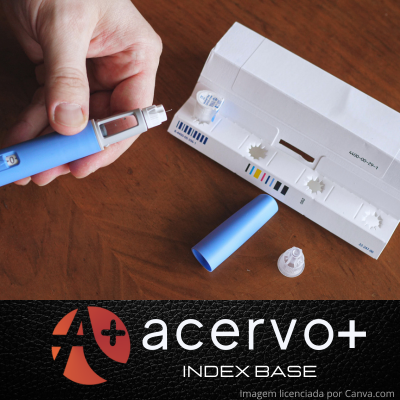Impactos sistêmicos do uso off-label da semaglutida
##plugins.themes.bootstrap3.article.main##
Resumo
Objetivo: Analisar impactos sistêmicos no uso off-label da semaglutida. Revisão bibliográfica: A semaglutida, um análogo do GLP-1, foi inicialmente aprovada para o tratamento do diabetes tipo 2. Estudos mostram que, além de reduzir os níveis de glicose, ela promove perda de peso ao induzir saciedade e retardar o esvaziamento gástrico, fatores que diminuem a ingestão calórica. No entanto, o uso off-label para emagrecimento, sem supervisão médica, é uma prática crescente, impulsionada pela rápida perda de peso e pela popularidade do medicamento. Os efeitos adversos mais comuns incluem náuseas, vômitos e risco de colelitíase. Complicações estéticas, como a "Ozempic Face", caracterizada por flacidez e envelhecimento facial, também têm sido relatadas. Considerações finais: Embora a semaglutida demonstre eficácia na perda de peso, a falta de supervisão médica no uso off-label pode acarretar riscos à saúde e efeitos indesejados. Portanto, devido aos riscos, os pacientes devem ser monitorados, e mudanças no estilo de vida devem ser integradas ao tratamento para evitar a recidiva do peso. A popularidade do uso off-label ressalta a necessidade de estudos adicionais para entender melhor os efeitos a longo prazo e para desenvolver diretrizes que orientem o uso seguro e eficaz deste medicamento.
##plugins.themes.bootstrap3.article.details##
Copyright © | Todos os direitos reservados.
A revista detém os direitos autorais exclusivos de publicação deste artigo nos termos da lei 9610/98.
Reprodução parcial
É livre o uso de partes do texto, figuras e questionário do artigo, sendo obrigatória a citação dos autores e revista.
Reprodução total
É expressamente proibida, devendo ser autorizada pela revista.
Referências
2. BARTEL S, et al. Use of glucagon-like peptide-1 receptor agonists in eating disorder populations. The international journal of eating disorders, 2024; 57(2): 286–293.
3. BLUNDELL J, et al. Effects of once-weekly semaglutide on appetite, energy intake, control of eating, food preference and body weight in subjects with obesity. Diabetes, obesity & metabolism, 2017; 19(9): 1242–1251.
4. BUTUCA A, et al. An assessment of semaglutide safety based on real world data: From popularity to spontaneous reporting in EudraVigilance database. Biomedicines, 2024; 12 (5): 1124.
5. CHAO AM, et al. Semaglutide for the treatment of obesity. Trends in cardiovascular medicine, 2023; 33(3): 159–166.
6. CHRISTOU GA, et al. Semaglutide as a promising antiobesity drug. Obesity reviews: an official journal of the International Association for the Study of Obesity, 2019; 20(6): 805–815.
7. CORTES TM, et al. Effect of semaglutide on physical function, body composition, and biomarkers of aging in older adults with overweight and insulin resistance: Protocol for an open-labeled randomized controlled trial. JMIR research protocols, 2024; 13: 62667.
8. FRANCISQUELI FV, et al. Obesidade, inflamação e complicações metabólicas. Nutrire, 2015; 81-89.
9. GAO X, et al.Efficacy and safety of semaglutide on weight loss in obese or overweight patients without diabetes: A systematic review and meta-analysis of randomized controlled trials. Frontiers, 2022; 10: 3389.
10. GHUSN W, et al. Weight loss and cardiovascular disease risk outcomes of semaglutide: a one-year multicentered study. Int J Obes, 2024; 48: 662–667.
11. HAN SH, et al. Public interest in the off-label use of glucagon-like peptide 1 agonists (Ozempic) for cosmetic weight loss: A Google Trends analysis. Aesthetic surgery journal, 2023; 44(1): 60–67.
12. LEXCHIN J, et al. Semaglutide: a new drug for the treatment of obesity. Drug and therapeutics bulletin, 2023; 61(12): 182–188.
13. LINCOFF AM, et al. Semaglutida e desfechos cardiovasculares na obesidade sem diabetes. New England Journal of medicine, 2023; 389(24): 2221–2232.
14. MAILHAC A, et al. Semaglutide (Ozempic®) use in Denmark 2018 through 2023 ‒ user trends and off-label prescribing for weight loss. Clinical epidemiology, 2024; 16: 307–318.
15. O’NEILL ES, et al. Injectable weight loss medications in plastic surgery: What we know, perioperative considerations, and recommendations for the future. Plastic and reconstructive surgery. Global open, 2024; 12(1): 5516.
16. ROCHA RI, et al. Skin changes due to massive weight loss: Histological changes and the causes of the limited results of contouring surgeries. Springer, 2021; 10:1007.
17. RYAN DH, et al. Long-term weight loss effects of semaglutide in obesity without diabetes in the SELECT trial. Nature medicine, 2024; 30(7): 2049–2057.
18. SILLASSEN CDB, et al. Adverse effects with semaglutide: a protocol for a systematic review with meta-analysis and trial sequential analysis. BMJ open, 2024; 14(6): 84190.
19. SMITS MM e VAN RAALTE DH. Safety of semaglutide. Frontiers in endocrinology, 2021; 12: 645563.
20. SURAN M. As Ozempic’s popularity soars, here’s what to know about semaglutide and weight loss. American Medical Association, 2023.
21. TAN HC, et al. Efficacy and safety of semaglutide for weight loss in obesity without diabetes: A systematic review and meta-analysis. Journal of the ASEAN Federation of Endocrine Societies, 2022; 10: 15605.
22. TIMO, et al. Uso de semaglutina no tratamento da obesidade. Brazilian Journal of Health Review, 2022; 5(3): 10430–10440.
23. WHARTON S, et al. Gastrointestinal tolerability of once-weekly semaglutide 2.4 mg in adults with overweight or obesity, and the relationship between gastrointestinal adverse events and weight loss. Diabetes Obes Metab, 2022; (1): 94-105.
24. WILDING JPH, et al. Weight regain and cardiometabolic effects after withdrawal of semaglutide: The STEP 1 trial extension. Diabetes, obesity & metabolism, 2022; 24(8): 1553–1564.
25. WRIGHT JR e ARODA VR. Clinical review of the efficacy and safety of oral semaglutide in patients with type 2 diabetes considered for injectable GLP-1 receptor agonist therapy or currently on insulin therapy. Postgraduate Medicine, 2020; 132(2): 26-36.

